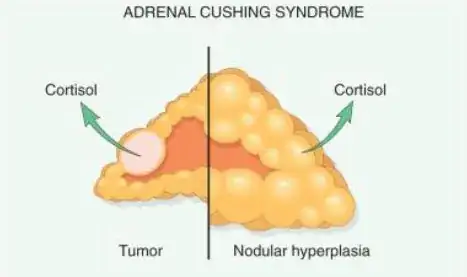To answer your question in the most simple way would refer to the common usage of the term "glucocorticoids" which is used in the plural by many books in the context of Cushing's syndrome.
For instance:
"... Glucocorticoids play an important role in blood pressure regulation. Several mechanisms have been postulated to explain how hypercortisolism leads to hypertension in Cushing’s syndrome. These include mineralocorticoid effects of cortisol, activation of the renin angiotensin system (...)", from: Sharma/Nieman, Cushing’s Syndrome: All variants, detection, and treatment
You say, "... taking glucocorticoids we would be talking just about cortisol...", and this is true. The term glucocorticoids used in that way colloquially refers to two different kinds of cortisol, of which there are commonly known cortison and cortisol (and both could be "taken", as they both exist as drugs, cortison might be obsolete though).
As your question suggests Cushing's syndrome is defined as a disease that is caused by "some" glucocorticoid, not by an excess of mineralocorticoids. The use of the plural of the term "glucocorticoid" might easily lead to misunderstanding that word "glucocorticoids" as some pars pro toto and so to say "pluralistic" term for "all corticoids", thus leading to mistaking mineralocorticoids (aldosterone) for a subtype of "glucocorticoids". (This might explain why your refer to tumours of "the gland"; tumours are involved in Cushing's as well as Addison's.)
So, to answer most trivially: mineralocorticoids are not a kind or sort of glucocorticoids.
However, what makes your question non-trivial is the fact that as the very same quote from literature (which I refered to in some linguistic approach trying to explain usage of definitions and terms) shows that "the" glucocorticoid named cortisol has - and that is no trivial knowledge - mineralocorticoid effects - after it has been turned into cortison.
So you have all three terms packed into one issue: the glucocorticoids as a plural: cortisol, cortison, and their "mineralocorticoid" effect. Here, some good advice would be to distinguish the usage of "Cushing's" as refering to cause or effect, i.e. excess of what kind of hormone to be distinguished from the clininal picture "Cushing's" that has to be delineated against other diseases in their similar or identical symptoms (differential diagnosis).
In fact, you may speak of Cushing's syndrome as a disease pattern, as a clinical picture, when these symptoms are caused by other hormones than "the glucocorticoids".
Wikipedia: "Cases due to a pituitary adenoma are known as Cushing's disease, which is the second most common cause of Cushing's syndrome after medication.[...] A number of other tumors, often referred to as ectopic due to their placement outside the pituitary, may also cause Cushing's.[...] Some of these are associated with inherited disorders such as multiple endocrine neoplasia type 1 and Carney complex.[7] Diagnosis requires a number of steps. (...)"
None of these other causes involves mineralocortiocids though.
This issue is to be distinguished from the fact that Cushing's as a disease of the adrenal glands must be distinguished from Addison's disease which is very different in clinical picture, however, which involves mineralocorticoids AND glucocorticoids. Thus, different from Addison's, Cushing's exclusively refers to glucocorticoid, different from Addison's that is said to be caused by both types of hormone. To memorize: With Cushing's mineralocorticoids, aldosterone, are not involved and there is no combined cause (glucco- plus mineralocorticoid; there only is some mineralocorticoid effect)
